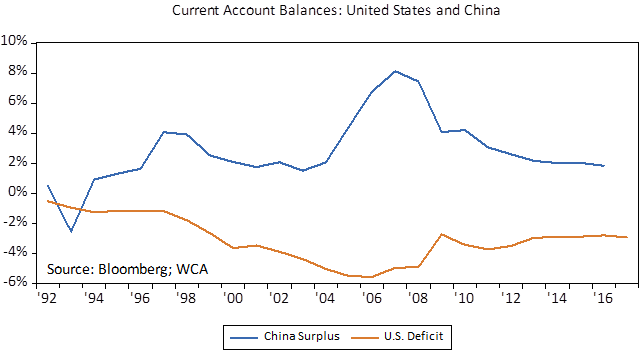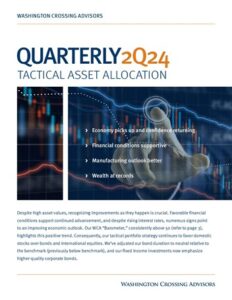Monday Morning Minute 012618
THE WEEK AHEAD
President Trump delivers State of the Union Tuesday; Federal Open Market Committee (FOMC) decision Wednesday (no change expected); Manufacturing and Employment data should be strong.
MACROECONOMIC INSIGHT
There is plenty of good feeling about growth these days. Recently, the International Monetary Fund bumped their ’18-19 world growth forecast 0.2% to 3.9%. This is higher than our assumption of 3.4% growth. Domestic growth forecasts are also strong. The Federal Reserve Banks of Atlanta and New York see first quarter real U.S. growth at 3.4% and 3.1%, respectively. These are some of the best growth numbers we’ve seen this cycle.
This week will likely bring even more good news. Thursday’s Institute of Supply Management’s report on domestic manufacturing should be a solid one, and Friday’s January employment report should also be strong. President Donald Trump will no doubt heap praise on the economy’s performance during his Tuesday night State of the Union Address. And while the Fed will not likely hike rates when they meet this week, they must incorporate the latest trends into their outlook for rates.
Beneath the surface, however, three important shifts are playing out at the same time. Monetary policy in the U.S. is growing less accommodative; fiscal policy here is becoming more expansionary; and trade is moving toward center stage.
Monetary Issue: We are not surprised to see the Federal Reserve continue along a tightening path given the momentum of the economy and reduced slack. The combination of reduced slack, a fiscal push (think tax cuts and larger deficits), and accelerating growth argue for more tightening ahead. A risk case for central banks might be if markets “get out in front” of policy changes. If this were to happen, it could make it difficult for central banks to dictate the pace of policy change.
Fiscal Issue: In our view, the near-term impulse from tax cuts on growth is a clear positive, especially investment. With withholding tables set to change later this month, we could begin to see growth strengthen further. At the same time, we expect to see increases in the fiscal deficit. The combination of faster growth and rising deficits could prompt more concern about “overheating”, requiring a more aggressive set of rate hikes by the Fed than currently expected.
Trade Issue: The announcement of new tariffs and quotas on washing machines and solar panels last week sent a message about trade. In our view, this issue is best seen in the context of an ongoing rebalancing of trade and capital flows with China (chart, below). For years, China has exported excess savings to the United States and we have exported demand to China. This is not a sustainable or healthy long-run growth plan for the globe, in our view. While the headlines of last week’s announcements focused on washing machines and solar panels, the real issues run far deeper.
A long-running period of easy monetary conditions, elevated valuations, and important shifts in global economic policies remind us that risk is not vanquished. For now, we will focus on the improved growth trajectory ahead, but we must balance that optimism with a dose of realism.
ECONOMIC DATA THIS WEEK
| Date | Report | Period | Survey | Prior |
| Monday, Jan 29: | Personal Income M/M | Dec | 0.3% | |
| Consumer Spending M/M | Dec | 0.6% | ||
| PCE Price Index M/M | Dec | 0.2% | ||
| Core PCE Price Index M/M | Dec | 0.1% | ||
| PCE Price Index Y/Y | Dec | 1.8% | ||
| Core PCE Price Index Y/Y | Dec | 1.5% | ||
| Tuesday, Jan 30: | FOMC Meeting begins | |||
| Consumer Confidence | Jan | 122.1 | ||
| S&P Case-Shiller HPI SA M/M | Nov | 0.7% | ||
| S&P Case-Shiller HPI NSA M/M | Nov | 0.2% | ||
| S&P Case-Shiller HPI NSA Y/Y | Nov | 6.4% | ||
| Wednesday, Jan 31: | FOMC Meeting Announcement | |||
| ADP Employment Report | Jan | 250K | ||
| Employment Cost Index Q/Q | 4Q2017 | 0.7% | ||
| Employment Cost Index Y/Y | 4Q2017 | 2.55 | ||
| Chicago PMI | Jan | 67.6 | ||
| Pending Home Sales Index M/M | Dec | 0.2% | ||
| Thursday, Feb 1: | Weekly Jobless Claims | 1/27 | 233K | |
| ISM Manufacturing Index | Jan | 59.7 | ||
| Nonfarm Productivity Q/Q | 4Q2017 | 3.0% | ||
| Unit Labor Costs Q/Q | 4Q2017 | -0.2% | ||
| PMI Manufacturing Index | Jan | 55.1 | ||
| Construction Spending M/M | Dec | 0.8% | ||
| Construction Spending Y/Y | Dec | 2.4% | ||
| Total Vehicle Sales | Jan | 17.9M | ||
| Domestic Vehicle Sales | Jan | 14.0M | ||
| Friday, Feb 2: | Nonfarm Payrolls M/M | Jan | 148K | |
| Unemployment Rate | Jan | 4.1% | ||
| Participation Rate | Jan | 62.7% | ||
| Average Hourly Earnings M/M | Jan | 0.3% | ||
| Average Hourly Earnings Y/Y | Jan | 2.5% | ||
| Consumer Sentiment | Jan | 94.4 | ||
| Factory Orders M/M | Dec | 1.3% | ||
| Source: Bloomberg |
ASSET ALLOCATION PORTFOLIO POSTURE
Based on shorter-term expectations, the “tactical satellite” allocation within portfolios is:
Overweight Stocks vs. Bonds
Kevin Caron, CFA, Senior Portfolio Manager
Chad Morganlander, Senior Portfolio Manager
Matthew Battipaglia, Portfolio Manager
Suzanne Ashley, Analyst
(973) 549-4052
www.washingtoncrossingadvisors.com
_______________________________________________________________________________________________________________________________________
Disclosures
WCA Fundamental Conditions Barometer Description: We regularly assess changes in fundamental conditions to help guide near-term asset allocation decisions. The analysis incorporates approximately 30 forward-looking indicators in categories ranging from Credit and Capital Markets to U.S. Economic Conditions and Foreign Conditions. From each category of data, we create three diffusion-style sub-indices that measure the trends in the underlying data. Sustained improvement that is spread across a wide variety of observations will produce index readings above 50 (potentially favoring stocks), while readings below 50 would indicate potential deterioration (potentially favoring bonds). The WCA Fundamental Conditions Index combines the three underlying categories into a single summary measure. This measure can be thought of as a “barometer” for changes in fundamental conditions.
The information contained herein has been prepared from sources believed to be reliable but is not guaranteed by us and is not a complete summary or statement of all available data, nor is it considered an offer to buy or sell any securities referred to herein. Opinions expressed are subject to change without notice and do not take into account the particular investment objectives, financial situation, or needs of individual investors. There is no guarantee that the figures or opinions forecasted in this report will be realized or achieved. Employees of Stifel, Nicolaus & Company, Incorporated or its affiliates may, at times, release written or oral commentary, technical analysis, or trading strategies that differ from the opinions expressed within. Past performance is no guarantee of future results. Indices are unmanaged, and you cannot invest directly in an index.
Asset allocation and diversification do not ensure a profit and may not protect against loss. There are special considerations associated with international investing, including the risk of currency fluctuations and political and economic events. Investing in emerging markets may involve greater risk and volatility than investing in more developed countries. Due to their narrow focus, sector-based investments typically exhibit greater volatility. Small company stocks are typically more volatile and carry additional risks, since smaller companies generally are not as well established as larger companies. Property values can fall due to environmental, economic, or other reasons, and changes in interest rates can negatively impact the performance of real estate companies. When investing in bonds, it is important to note that as interest rates rise, bond prices will fall. High-yield bonds have greater credit risk than higher-quality bonds. The risk of loss in trading commodities and futures can be substantial. You should therefore carefully consider whether such trading is suitable for you in light of your financial condition. The high degree of leverage that is often obtainable in commodity trading can work against you as well as for you. The use of leverage can lead to large losses as well as gains.
All investments involve risk, including loss of principal, and there is no guarantee that investment objectives will be met. It is important to review your investment objectives, risk tolerance and liquidity needs before choosing an investment style or manager. Equity investments are subject generally to market, market sector, market liquidity, issuer, and investment style risks, among other factors to varying degrees. Fixed Income investments are subject to market, market liquidity, issuer, investment style, interest rate, credit quality, and call risks, among other factors to varying degrees.
This commentary often expresses opinions about the direction of market, investment sector and other trends. The opinions should not be considered predictions of future results. The information contained in this report is based on sources believed to be reliable, but is not guaranteed and not necessarily complete.
The securities discussed in this material were selected due to recent changes in the strategies. This selection criteria is not based on any measurement of performance of the underlying security.
Washington Crossing Advisors LLC is a wholly owned subsidiary and affiliated SEC Registered Investment Adviser of Stifel Financial Corp (NYSE: SF).




